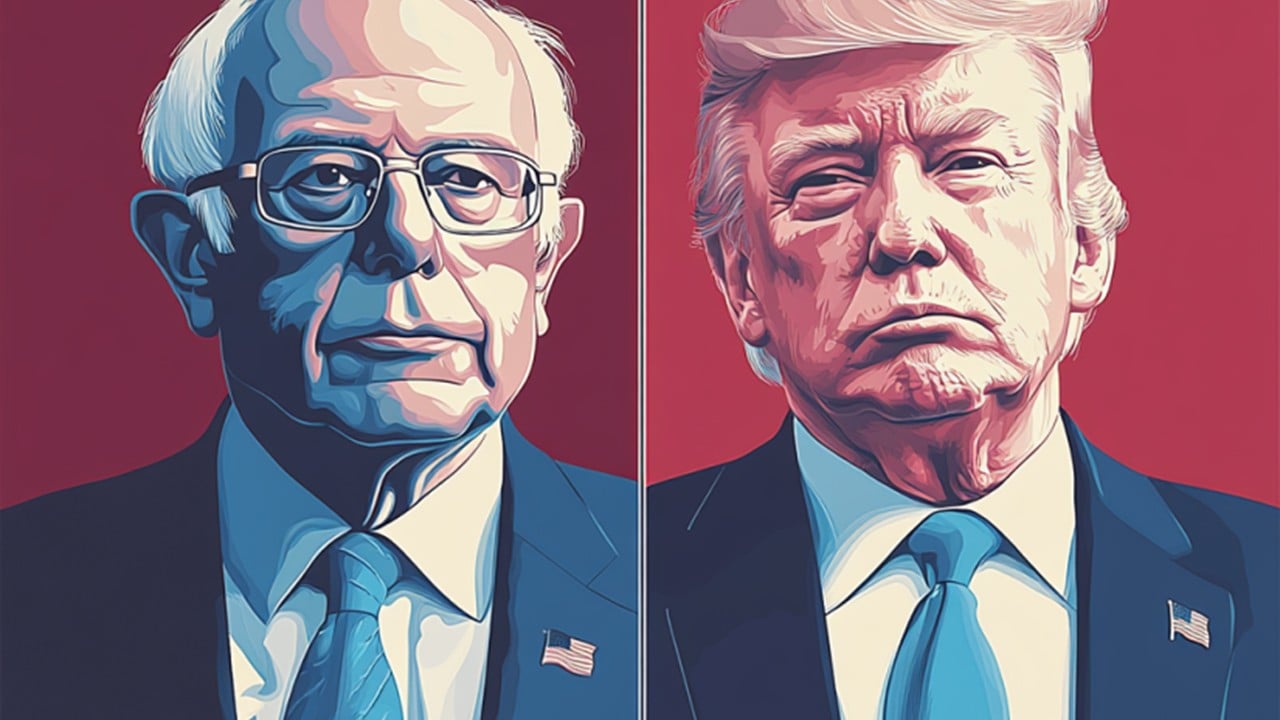
On the surface, Bernie Sanders and Donald Trump couldn’t be more different—one is a self-described democratic socialist advocating for wealth redistribution, while the other is a billionaire real estate mogul pushing nationalist populism.
And yet, there’s a surprising overlap in their base. Why is that?
Let’s dig in.
The Common Thread: Economic Frustration and Betrayal
The simplest explanation? Both Bernie and Trump speak to people who feel betrayed by the system.
Working-class Americans—whether they’re factory workers in the Rust Belt, small business owners struggling to keep up, or young people drowning in student debt—share a common grievance: the economy is rigged against them.
Trump and Sanders both tap into that frustration, though in radically different ways: Bernie points the finger at billionaires, Wall Street, and corporate greed, arguing that the rich have stacked the deck in their favor. Trump, on the other hand, blames immigrants, foreign nations, and the political elite, positioning himself as the outsider who will “drain the swamp.”
But at the core, both are telling struggling Americans: “You’ve been screwed over, and I’m the only one who sees it.”
Anti-Establishment Appeal
In a time when trust in government institutions is at an all-time low, people are drawn to leaders who promise to shake up the system.
Both Bernie and Trump present themselves as political outsiders. Bernie has spent decades railing against corporate influence in politics, while Trump’s entire 2016 campaign was built on the idea that he wasn’t like the “corrupt politicians” in Washington.
Whether or not either of them truly fit that label is up for debate, but perception matters more than reality in politics.
The Desire for Radical Change
Both men reject the status quo.
Bernie talks about a political revolution, advocating for Medicare for All, free college, and higher wages. Trump, meanwhile, speaks of “making America great again” by upending trade deals, cutting regulations, and challenging global alliances.
The details differ, but the message is the same: the old way isn’t working, and we need to burn it down and start fresh.
For many Americans, this is more appealing than the incrementalism of mainstream Democrats and Republicans.
When life isn’t getting better and the gap between rich and poor continues to widen, small policy tweaks don’t feel like enough. People want big, sweeping solutions.
They want someone who will fight for them—not just manage the decline.
The Populist Energy
At their rallies, both Trump and Bernie create a feeling of movement, of belonging.
Their supporters aren’t just voters—they’re part of something bigger. Whether it’s Trump’s MAGA rallies or Bernie’s grassroots organizing, both men energize their base by giving them a sense of purpose.
That energy is intoxicating. It’s why people who felt politically disengaged suddenly became passionate activists for these two figures.
When someone makes you feel seen, when they articulate your frustrations in a way no one else has, you become loyal. That’s why some disaffected Trump voters in 2016 switched to Bernie in the 2020 primaries—and why some Bernie supporters, frustrated with the Democratic establishment, held their noses and voted for Trump instead of Biden.
Where They Diverge
Of course, the key difference is what they do with that populist energy.
Bernie directs it toward systemic reform—breaking up big banks, taxing the rich, expanding social safety nets. Trump channels it into nationalism, scapegoating marginalized groups, and consolidating power. One approach is about building a more equitable society, while the other often veers into authoritarianism.
That’s why it’s so important to understand this crossover appeal.
If we don’t address the economic pain and disillusionment that drives people to seek radical change, that frustration will continue to be exploited. Progressives can’t afford to dismiss these voters.
Instead, they should be asking: What is it that makes people willing to consider both Trump and Bernie? And how can we offer real solutions that channel that anger into something constructive rather than destructive?
The Lesson for Progressives
The biggest takeaway? People are desperate for leaders who speak to their struggles, who acknowledge their pain, and who promise bold action.
If progressives want to win over the voters who might be torn between a Trump-style strongman and a Bernie-style movement-builder, they need to focus less on policy jargon and more on speaking directly to people’s lived experiences.
Bernie understands this. That’s why, despite being labeled a socialist, he managed to win over many working-class voters in conservative states.
The question is: Can other progressive leaders learn from that playbook? Because if they don’t, the Trumps of the world will continue to exploit that frustration, offering easy scapegoats instead of real solutions.
Bottom Line: We need leaders who can speak to people’s pain without resorting to fear-mongering. Who can inspire hope without selling false promises. Who can channel disillusionment into a movement that actually lifts people up.
The choice isn’t just between left and right—it’s between solidarity and division, between real change and empty slogans.
The stakes couldn’t be higher.
**

The book from Keith Giles, “The Quantum Sayings of Jesus: Decoding the Lost Gospel of Thomas” is available now on Amazon. Order HERE>
Keith Giles is the best-selling author of the Jesus Un series. He has been interviewed on CNN with Anderson Cooper, Coast to Coast Radio with George Noory, USA Today, BuzzFeed, and John Fugelsang’s “Tell Me Everything.”
He co-hosts The Heretic Happy Hour Podcast and his solo podcast, Second Cup With Keith which are both available on Spotify, Amazon, Apple, Podbean or wherever you find great podcasts.

















